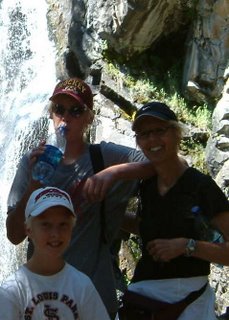It was interesting to read Williams and Carney's articles on writer's workshops because I have been thinking and talking about the merit and weakness of group work with my supervising teacher. Working in groups can be great for brainstorming and generating ideas, however, I think students get much more done if they work on their own or with someone of like ability. I realize that it's sacrilegious to "dis" group work at the U of M - what with the Johnson brothers in our own backyard - but I think group work, especially with heterogeneous groups wastes a lot of time and is frustrating for all involved.
Writing is such a unique process because, on one hand it is a very personal and private activity, and on the other hand it requires interaction, input, and reaction from others. The way Carney has set up her writing classes better reflects how I see my self teaching writing. Don't get me wrong, much of Williams was practical and gave me a great framework for using writing workshops in my own classroom. Two prewriting ideas that were exciting to me were using freewriting to get students to work on writing ideas and talk-writing. Talk-writing seems like a good way to help students focus their topic and understand the direction their paper will take. I also agree with Williams that the best writing will come from authentic assignments. Chapter 4 deals almost exclusively with how to get writing groups to work, and I think that in that regard, Carney has a much more realistic handle on what actually happens and works best in a high school classroom. In Carney's classroom, the workshop is more efficient because group work is limited to editing drafts - and then the students are paired, not in groups of 5. The writing workshop in Carney's classroom is a little less student centered, but reflects the reality of teaching writing to 30+ students in a Language Arts classroom. Williams is the researcher saying what he thinks a writer's workshop should be. Carney is a skilled classroom teacher who knows the reality of teaching writing to students in real school situations. Both agree on much - however, the biggest difference in their practice of writer's workshop is group work and I have to side with Carney.
I love the practicality of the Atwell piece. It has a lot of great ideas for minilectures. I think what I like best about Atwell is that a lot of what she teaches comes organically from what is happening in her classroom. If several students are struggling with similar issues, she comes up with a minilesson that addresses that issue. She is in tune with her students and allows the class to flow organically from them. I know I'm out of step with the student centered group fad - but Atwell's classes are what I call student centered classrooms!
The Writer's Window is a very useful website where students can publish their writing or get go to the writer's workshop link where they can get help with their writing. For example, if students are have a hard time with "show don't tell" they can click on the writer's workshop note on the homepage and then click on the "show don't tell" link and they are directed to a helpful web page that can help them master the concept.
Subscribe to:
Post Comments (Atom)

5 comments:
It is hard to critique group work when so many benefits seem to be cited throughout our readings. I do like the idea of peer editing and I think it can be very successful. However, from a personal standpoint, I am extremely tired of group work. It is frustrating when some members work efficiently and other do not. But at the same time, I have had some excellent group experiences. I think it's important to offer opportunities for both group and individual work in the classroom.
Hecks yeah. Group work is nice and all that writing is a highly individual process. The only real benefit, and the readings go deeper into it, to the writing groups is the peer-editing process and generating ideas. For everything else I will definitely use individual work in the classrooms.
I'm going to go ahead and echo your sentiments, and theirs, about group work. I think pairs and peer editing partners are a much more efficient way of producing good writing habits. In pairs there is more constructive criticism thrown into the mix as well as a feeling of teamwork since the final outcome of the piece is directly related to the relationship of the pair.
I also like your discussion of Atwell's minilessons. I think a big challenge as a beginning teacher will be to allow time to deviate from the lesson plan to cover and recover difficult material. Being flexible is key!
I think that writing is better accomplished by having a "second set of eyes". I think that many teachers don't look at writing as a personal and public task. I firmly believe that writing is a social action. It is not meant to be something that is a private affair. However, I am concerned that young adults might be too shy to critique each other justly, and writing may not improve... any ideas?
In response to the other Sarah, I think that the only way to get students to really share themselves and offer each other help is to create a safe space. I think that the environment of the classroom is more important to learning than anything else. If you remember the spoken word teacher, Melissa, who came to talk to Cynthia's class, she spoke about the importance of creating a safe space. Her students wrote about and shared some very personal material. Yet Melissa had created a safe and supportive place for the students to take risks and chances. I think it all comes back to the safe space.
Post a Comment